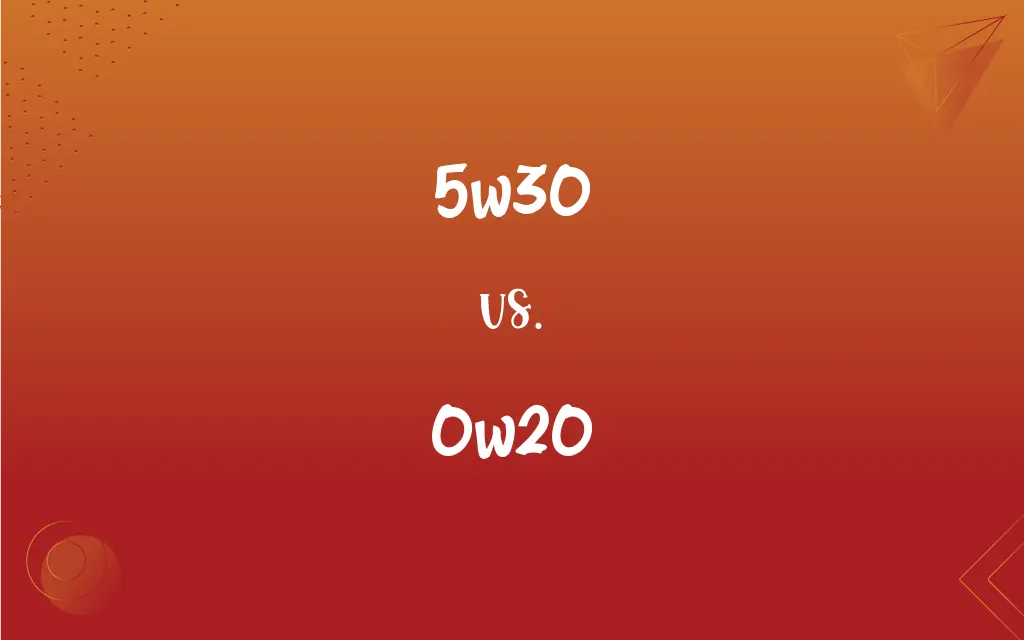5w30 vs. 0w20: What's the Difference?
Edited by Harlon Moss || By Janet White || Published on February 28, 2024
5W30 and 0W20 are both multigrade motor oils; 5W30 provides higher viscosity at higher temperatures, suitable for a wider range, while 0W20 offers better fuel efficiency and lower viscosity, ideal for colder climates.

Key Differences
5W30 is a multigrade oil where '5W' indicates the viscosity in cold temperatures and '30' refers to its viscosity at higher temperatures. 0W20, also a multigrade oil, has '0W' indicating its lower viscosity in cold conditions and '20' for its viscosity at higher temperatures, which is thinner than 5W30.
The number before the 'W' (Winter) in 5W30 signifies that it is suitable for colder temperatures but not as effective as 0W20, which has a lower viscosity in cold conditions, allowing for quicker engine starts and better cold-weather performance.
In terms of engine protection, 5W30 offers better lubrication at higher temperatures and is ideal for a wide range of vehicles, including those operating in warmer climates. 0W20, with its thinner consistency, is typically recommended for newer vehicle models and is especially beneficial for improving fuel efficiency.
5W30 oil is widely used and compatible with a broad range of vehicles, both old and new. Conversely, 0W20 is often specified for modern engines designed for improved fuel economy and lower emissions, especially in hybrid and high-efficiency engines.
Environmental considerations also play a role; 5W30 provides stable performance in varied conditions, while 0W20, being thinner, helps in reducing engine drag and thereby slightly improving fuel economy and reducing emissions.
ADVERTISEMENT
Comparison Chart
Cold Weather Viscosity
Higher viscosity in cold
Lower viscosity in cold
High Temperature Viscosity
Higher (30)
Lower (20)
Ideal Usage
Broad range of vehicles
Newer, high-efficiency engines
Fuel Efficiency
Standard
Improved
Environmental Impact
Standard performance
Better for fuel economy
ADVERTISEMENT
5w30 and 0w20 Definitions
5w30
5W30 offers good engine protection across various climates.
Choosing 5W30 ensures my engine is protected, regardless of the weather.
0w20
0W20 motor oil has a thinner consistency at operating temperatures.
0W20 oil stays thinner in my engine, reducing drag and improving efficiency.
5w30
5W30 is a common choice for standard driving conditions.
For everyday driving, 5W30 oil is a reliable and safe choice.
0w20
0W20 enhances fuel efficiency in high-efficiency engines.
Using 0W20 oil contributes to better fuel economy in my hybrid car.
5w30
5W30 maintains higher viscosity at higher temperatures.
5W30 oil maintains its thickness better under high engine heat.
0w20
0W20 is a low-viscosity oil ideal for cold climates and modern engines.
In cold weather, 0W20 oil helps my car start more easily.
5w30
5W30 is a multigrade motor oil suitable for a wide range of temperatures.
I use 5W30 oil for my car as it performs well in both winter and summer.
0w20
0W20 is recommended for newer vehicle models, particularly hybrids.
The manufacturer specifies 0W20 oil for my new car for optimal performance.
5w30
5W30 motor oil is compatible with many older and newer vehicle models.
My mechanic recommended 5W30 because it's compatible with my older model car.
0w20
0W20 is beneficial for reducing emissions and environmental impact.
I choose 0W20 oil to help reduce my car's environmental footprint.
FAQs
What does 5W30 mean in motor oil?
5W30 indicates the oil's viscosity in cold (5W) and hot (30) temperatures.
Is 0W20 good for older engines?
0W20 is generally recommended for newer engines, not older ones.
Is 0W20 oil environmentally friendly?
0W20 is more environmentally friendly due to improved fuel economy and reduced emissions.
Is 0W20 better for fuel efficiency?
Yes, 0W20 can improve fuel efficiency due to its lower viscosity.
What types of vehicles is 5W30 best for?
5W30 is versatile and suitable for a broad range of vehicles.
Is 0W20 suitable for high-mileage cars?
0W20 is typically used in newer, not high-mileage, cars.
Does 5W30 oil improve fuel economy?
5W30 provides standard fuel economy, not as high as 0W20.
Can I use 5W30 oil in winter?
Yes, 5W30 works well in winter, though not as optimal as 0W20 in very cold conditions.
Is 0W20 recommended for turbocharged engines?
Yes, many manufacturers recommend 0W20 for modern turbocharged engines.
How does temperature affect 5W30 oil performance?
5W30 performs well in a wide range of temperatures.
Does 0W20 oil provide good engine protection?
0W20 provides excellent protection, especially in modern engines.
Is 5W30 oil thick or thin?
5W30 has a medium thickness, suitable for a range of temperatures.
What is the primary benefit of 0W20 oil?
The primary benefit of 0W20 is better fuel efficiency and cold-weather performance.
Can I switch from 5W30 to 0W20?
Switching should be based on manufacturer recommendations and engine type.
Can I mix 5W30 with other oils?
Mixing 5W30 with other oils is not recommended as it can alter its properties.
How often should I change 5W30 oil?
Oil change intervals for 5W30 depend on the vehicle and driving conditions.
What's the best season to use 5W30 oil?
5W30 is versatile and can be used in any season.
What are the storage requirements for 0W20 oil?
Store 0W20 in a cool, dry place, away from direct sunlight.
Can 0W20 be used in hot climates?
0W20 can be used in hot climates, especially in engines designed for it.
Does 0W20 oil reduce engine wear?
0W20 can reduce wear by providing quick lubrication in cold starts.
About Author
Written by
Janet WhiteJanet White has been an esteemed writer and blogger for Difference Wiki. Holding a Master's degree in Science and Medical Journalism from the prestigious Boston University, she has consistently demonstrated her expertise and passion for her field. When she's not immersed in her work, Janet relishes her time exercising, delving into a good book, and cherishing moments with friends and family.
Edited by
Harlon MossHarlon is a seasoned quality moderator and accomplished content writer for Difference Wiki. An alumnus of the prestigious University of California, he earned his degree in Computer Science. Leveraging his academic background, Harlon brings a meticulous and informed perspective to his work, ensuring content accuracy and excellence.






































































